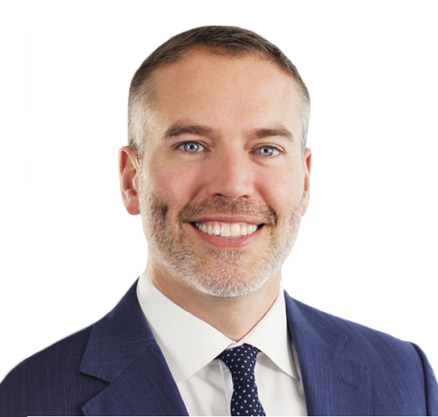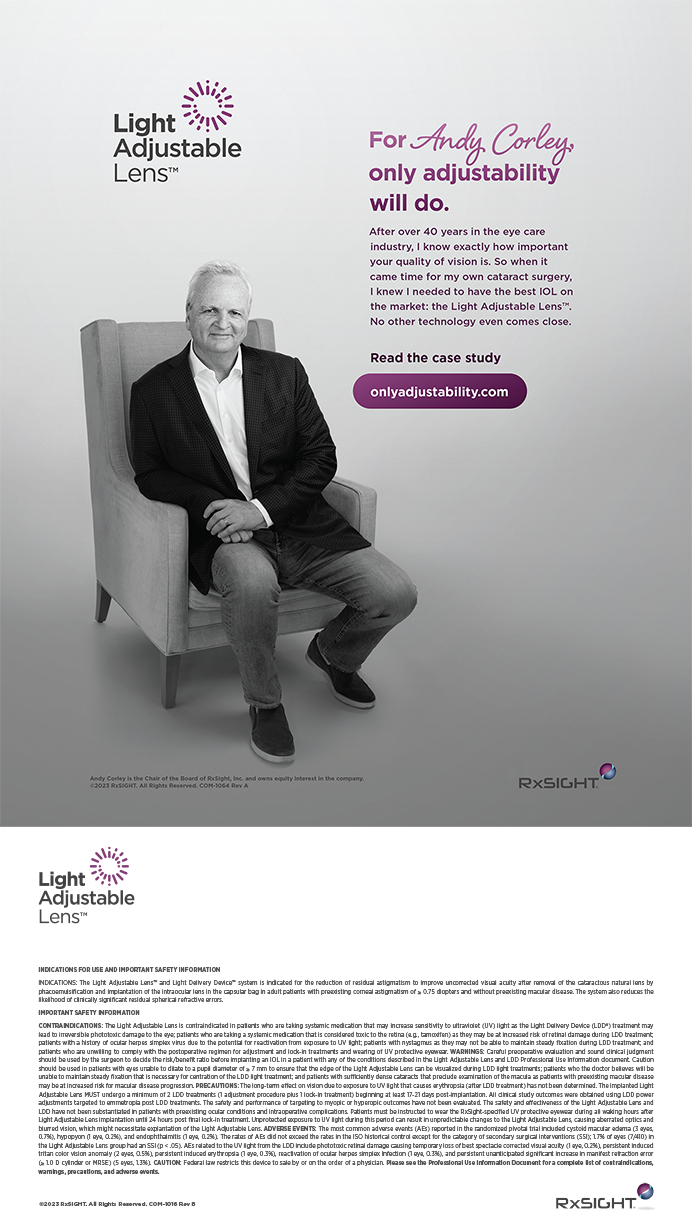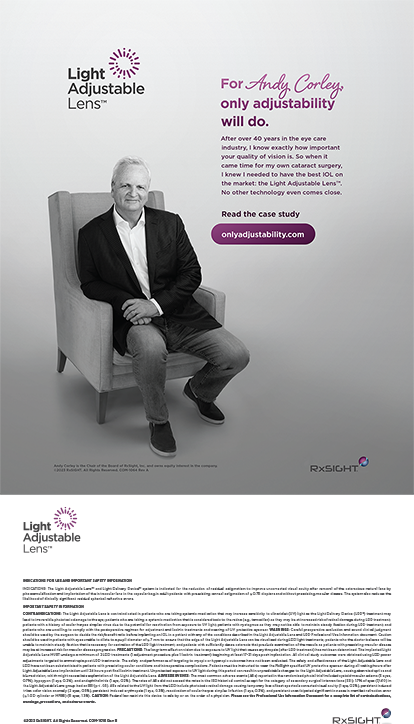Companies: astigmatismfix.com, Equinox Ophthalmic, ExpertOpinion.MD, Melt Pharmaceuticals
Clinical Practice: Vance Thompson Vision, Sioux Falls, South Dakota
Claim to Fame: Finding solutions for unmet needs in eye care

CRST: You are one of a small group of US surgeons who are fellowship trained in cornea, glaucoma, and refractive surgery. How have you found opportunities to apply your clinical and surgical skills to entrepreneurship?
John P. Berdahl, MD: When I was a resident at Duke University, the late David Epstein, MD, our chairman, said that clinical care is our scientific laboratory. We have a front row seat to unmet needs, so it is incumbent on us to come up with a solution. A patient with normal-tension glaucoma experiencing disease progression, insufficient sedation during cataract surgery, a problem with a toric lens—those are all problems we saw and tried to solve.
CRST: In your different ventures, have you used similar business models, or have they varied?
Dr. Berdahl: I have taken part in founding a device company, two drug companies, and two digital companies. As evidenced by the variety of company types, I’m not doing a good job of building on my prior experiences, so no, the business models haven’t necessarily been the same. The principles underlying their foundation, however, are similar: If there’s an unmet need we can solve, we put together a group of people who can do the work to try to fill that need. Boy, is there a lot of work to it! It’s probably good that you don’t know how tall the mountain is. Otherwise, entrepreneurs might not start the journey, and innovation would stall.
CRST: With several businesses to manage and clinical practice, relying on others to help run the business is crucial. What qualities and experience do you look for when hiring employees for these ventures?
Dr. Berdahl: My success depends entirely on other people. I look for self-motivated individuals who want to go out there and do the work. When we interview employees at Vance Thompson Vision, we have them watch a video by American author Simon Sinek about what their why is and ask them to send in a short video about what they thought. We pay attention to how quickly they do that and how high-quality it is. With the pace of business and the pace of life, we want people who are responsive, and that’s another thing we pay attention to. I want to go to work and be a part of ventures that energize me. The only way that happens is if the group of people involved bring more energy to the system than they take.
More important than competency is a willingness to learn. You can learn to be competent if you’re not already. If you believe somebody is willing to learn to be competent, that’s okay, but if they have a willingness to learn and they’re already competent, that’s even better.
CRST: At what point in the journey do you consider outsourcing or taking a step away from the business?
Dr. Berdahl: As soon as I can. I generally prefer not to be the executor of the business but rather a close advisor. There’s not much quite as satisfying as actually doing the work, but there is probably even more joy in seeing somebody get an opportunity and succeed. I want to create a team and give them the autonomy to make difficult decisions and then guide them to make better decisions. They’ve also got to push back on me to make sure that I don’t screw it up.
CRST: Your most recent venture is Melt Pharmaceuticals. What is the company doing? Can you share some recent phase 2 data?
Dr. Berdahl: The traditional approach to sedation was the intravenous administration of midazolam and fentanyl. At our surgery center, we wanted to try sublingual sedation. We found that sublingual midazolam syrup worked, but we wanted more consistent and effective sedation. I had heard that intravenous ketamine might be beneficial, but I did not want return to the intravenous route. We challenged our local pharmacy and anesthetist to figure out how to administer ketamine sublingually. They put liquid midazolam and ketamine underneath the tongue. I loved the sedation achieved, but the taste was terrible. Also, patients couldn’t hold that much liquid underneath their tongue.
I had heard from William F. Wiley, MD, and Richard L. Lindstrom, MD, that Harrow Health was doing some neat things. I asked the company if it could compound midazolam and ketamine in a tablet that would dissolve underneath the tongue. The company agreed, and we entered into an agreement. Melt Pharmaceuticals was spun off from Harrow Health. After hundreds of thousands of compounded melts had been used, we tweaked the formulation to have a better form factor and taste. That’s the product currently in phase 2 FDA trials.
Some top-line data were released in late 2022 showing that about twice as many patients achieved adequate sedation with the MK Melt compared to sublingual midazolam or ketamine alone.1 The results were even better than we expected. The study had four arms: (1) MK Melt, (2) sublingual midazolam alone, (3) sublingual ketamine alone, and (4) placebo. We are eager to get phase 3 trials started.
CRST: Of all your experiences with innovation and invention, which venture has been your favorite?
Dr. Berdahl: The one that occupies the biggest part of my heart and mind is probably Equinox, which has also been the toughest one. It’s different from everything else. One of the challenges with any startup company—and certainly Equinox—is that they have near death experiences. We’re going to see if we can figure out a way to take another shot on goal because we believe that the technology can help glaucoma patients.
CRST: What is something you will not compromise on?
Dr. Berdahl: Doing what’s right. An advisor once told me there would come a time when I would have to fight for things in uncomfortable ways, which implied to me that it can be a dirty game. I don’t know if I’m willing to do that. When putting my head on the pillow at night—even with the struggles that Equinox has faced—we always tried to do right by the team, shareholders, and patients. The moment we compromise our values is the moment we can’t quite recover in our own hearts. If we make a mistake, we should try to make it right, but I won’t compromise on doing what I believe is the right thing to do.
CRST: What has being an inventor and business owner brought to your unique skill set as a clinician?
Dr. Berdahl: Anytime you learn a skill or to think better, you can apply that to future situations, whether that’s in your clinical practice or in your relationships. It comes at a cost, however, and that cost is always time and sometimes money or reputational risk.
I’ve learned that sometimes incentives become disincentives. How do you scale? If it’s just you in a company, you don’t need to spend time communicating. The moment you hire the first person, 10% of your time and theirs is spent communicating; two people are doing the work of 1.8. That continues with each hire. I’ve learned that the only way it works is if every stakeholder—patients, the company, insurers or payers, and doctors—benefits. That’s hard to achieve.
Another lesson is that being direct is best. Otherwise, people may live with an assumption that isn’t quite right.
I’ve also learned from mistakes that the most important thing is to try to be a good father and husband. Know what and whom you care about the most. At home, for me, it’s family and faith. At work, it’s our people in our practice. Everything else has to come second for me. Knowing your priorities and trying to make your behaviors align with them are key.
1. Melt Pharmaceuticals announces top-line results of pivotal phase 2 study of MELT-300 sublingual, needle-free sedation for cataract surgery. Melt Pharmaceuticals, Inc. News release. December 21, 2022. Accessed April 20, 2023. https://www.businesswire.com/news/home/20221221005298/en/




